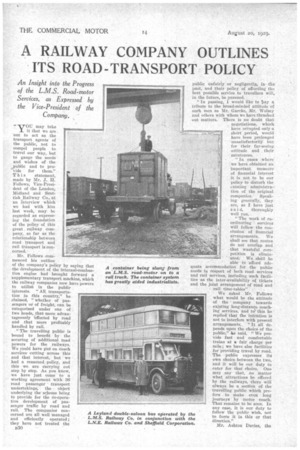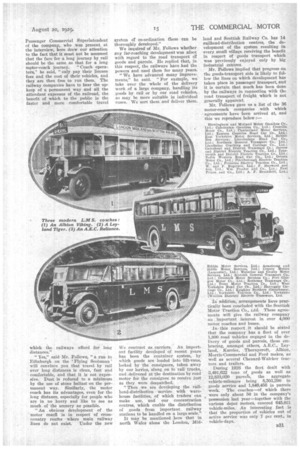A RAILWAY COMPANY OUTLINES ITS ROAD TRANSPORT POLICY
Page 56

Page 57

If you've noticed an error in this article please click here to report it so we can fix it.
An Insight into the Progress of the L.M.S. Road-motor Services, as Expressed by the Vice-President of the
• Company.
!.-xTOU may take j_ it that we are out to act as the transport agentsof the public; not to compel people to travel our way, but to gauge the needs and wishes of the ,public and to provide for them." This statement, made by Mr. J. EL Follows, Vice-President of the London, Midland and Seottish Railway Co., at an interview which we had with him last week, may -be regarded as expressing the foundation of the policy of this great, railway company, so far as the relationship between road transport and rail transport is concerned.
•
"The travelling public is bound to benefit by the securing of additional road powers for the ,railways. We eindd have Put ou coach servicescutting across this and that interest, but we had a reasoned policy, and this we are Carrying out step by step. As you know, we have just come to a working agreement with 36 road passenger transport undertakings, the object underlying the scheme being to provide for the co-operative development of passenger traffic by road and rail. The companies concerned are all well managed and efficiently operated ; they have not treated the
1330 public unfairly or negligently; in the past, and their policy of affording the best poSsible service to travellers will, in the future, be pursued.
"In passing, I would like to tay tribute to the broad-minded attitude of such men as Mr. Gareke, Mr. Wolsey and others with whom we have thrashed out matters. There is no doubt that
. negotiations, which have occupied only a short period, would have been prolonged unsatisfactorily but for their, far-seeing attitude and their astuteness.
"Iii cases where' we have obtained au important measure of financial interest it is not to be our policy to disturb the existing adminiStra-• tion of the original companies. Speaking generally, they are, as I have just said, thoroughly well run.
"The work of coordinating services will follow the conclusion* of financial arrangements. We shall see that routes do not overlap and that wasteful competition is elinint-ated." We shdll be able to afford adequate aecommodation for the public needs in respect of both road services and rail services, including 'such facilities as the inter-availability of tickets and the joint arrangement of road and rail time-tables" 'We asked Mr. Follows What would be the attitude of the company towards existing long-distance coaching services, and to‘ this he replied that the intention is not to interfere. with present arrangements.. "It all depends uticin the choice of the public," lie said. "We provide fast and comfortable trains at a fair charge per mile ; we have also facilities for providing travel by road. The public expresses its own choice between the two, and it will be our duty to cater for that choice. One may say that no matter what attractions be offered by the railways, -there will always be a section of the travelling public which prefers to .make even long journeys by motor coach. That remains to be seen. In any case, it is our duty to follow the public wish, not to force it in this or that direction."
Mr. Ashton Davies, the Passenger Commercial Superintendent of the company, who was present at the interview, here drew our attention to the fact that it must not be assumed that the fare for a long journey by rail should be the same as that for a long motor-coach journey. "Coach operators," he said, "only pay their licence fees and the cost of their vehicles, and they are then free to run them. The railway companies have to bear the upkeep of a permanent way and all the attendant expenses of the railroad, the benefit of which to the public is the faster and more comfortable travel which the railways afford for long distances."
"Yes," said Mr. Follows, "a run to Edinburgh on the 'Flying Scotsman' will convince you that travel by rail over long distances is clean, fast and comfortable, and that it is not expensive. Dust is reduced to a minimum by the use of stone ballast on the permanent way. Similarly, the motor coach has its advantages, even for the long distance, especially for people who are in no hurry and like to see as much of the scenery as possible.
"An obvious development of the motor coacli is in respect of crosscountry routes where main railway lines do not exist Under the new
system of co-ordination these can be thoroughly developed."
We inquired of Mr. Follows whether any far-reaching development was afoot with regard to the road transport of goods and parcels. He replied that, in this respect, the railways have had the powers and used them for many years.
"We have advanced many improvements," he said. "For example, we take over the whole of the delivery work of -a large company, handling its goods by rail or by our road vehicles, as may be more suitable in individual cases. We sort them and deliver them.
We contract as carriers. An important facility, developed of recent years has been the container system, by which goods are loaded into lift-vans, locked by the consignors, taken away by our lorries, 'slung, sinto rail trucks, and delivered at the destination by road motor for the consignee to receive just as they were despatched.
" Then we are developing the railhead-distribution service with warehouse facilities, of which traders can make use, and our concentration centres, which enable the distribution of goods from important railway stations to be handled on a large scale."
It may be mentioned here that in north Wales alone the London, Mid
land and Scottish Railway Co. has 14 railhead-distribution centres, the development of the system resulting in every small village receiving the benefit in respect of goods transport which was previously enjoyed only by big industrial centres.
Mr. Follows implied that progress on the goods-transport side is likely to follow the lines on which development has taken place in passenger transport, and it is certain that much has been done by the railways in connection with the road transport of freight which is not generally apparent.
Mr. Follows gave us a list of the 36 motor-coach companies with which agreements have been arrived at, and this we reproduce below :—
Birmingham and Midland Motor Omnibus Co., Ltd.; Caledonian Omnibus Co., Ltd.; Crosville Motor Co., Ltd.; L'umberland Motor Services, Ltd.; Eastern Counties Road Car CO.Ltd.; East Yorkshire Motor Services, Ltd.; .liebble Bus Services; Lincolnshire Road Car Co., Ltd.; Northern General Transport Co., Ltd.; Llandudno Coaching and Carriage Co., Ltd.; Gateshead and District Tramways Co.,• Jarrow and District Electric Traction Co., Ltd.; Tynemouth and District Electric Traction Co., Ltd.; Noeth Western Road Car Co., Ltd.; Ortona Motor Co., Ltd.; Peterborough Electric Traction Co., Ltd.; Potteries Electric Traction Co., Ltd.; W. and F. Rogerson, Ltd.; F. Bsyward and Son, Ltd.; Wm. Proctor and Co., Ltd.; Paul Prince and Co., Ltd.; A. F. Brookfield, Ltd.;
Ribble Motor Services, Ltd.; Armstrong rod Siddle Motor Services, Ltd.; County Motors (Lancaster), Ltd:; Waterloo and Crosby Motor Services, Ltd. ,• Scottish General Transport Cu;,Ltd.; Greenock Motor Services Co.; Port Glasgow Motor CoLtd.' Rothesay Tramways Co., M Ltd.; Trent Motor Traction Co., Ltd.; West Yorkshire Road Car (B.; Ltd.; Harrogate Carriage Co., Ltd.; Keighley Brothers (Omnibuses), Ltd.; Yorkshire Traction Co., Ltd.; Yorkshire ("Woollen District) Electric 'Tramways, Ltd.
In addition, arrangements have.practically been concluded with the Scottish Motor Traction Co., Ltd. These agreements. will give the railway company an .important interest in over 4,000 motor. coaches and buses.
In this respect it should be stated that the company has a fleet of over 1,800 road vehicles engaged in the delivery of goods and parcels, these embracing, amongst others, A.E.C., Leyland, Karrier, Thornycroft, Albion, Morris-Commercial and Ford makes, as well as several Chenard-Walcker tractors and trailers.
During 1928 the fleet dealt with 3,491,622 toes of goods as well as 12,833,020 parcel's, the aggregate vehicle-mileages being 8,303,290 in good a service and 1,849,456 in parcels work. The coaches—Of which. there were only about 50 in the company's possession last year—together with the various depot motors, covered 645,031 vehicle-miles. An interesting fact . is that the proportion of vehicles out of active service was only 7 per cent., in vehicle-days.




















































































































